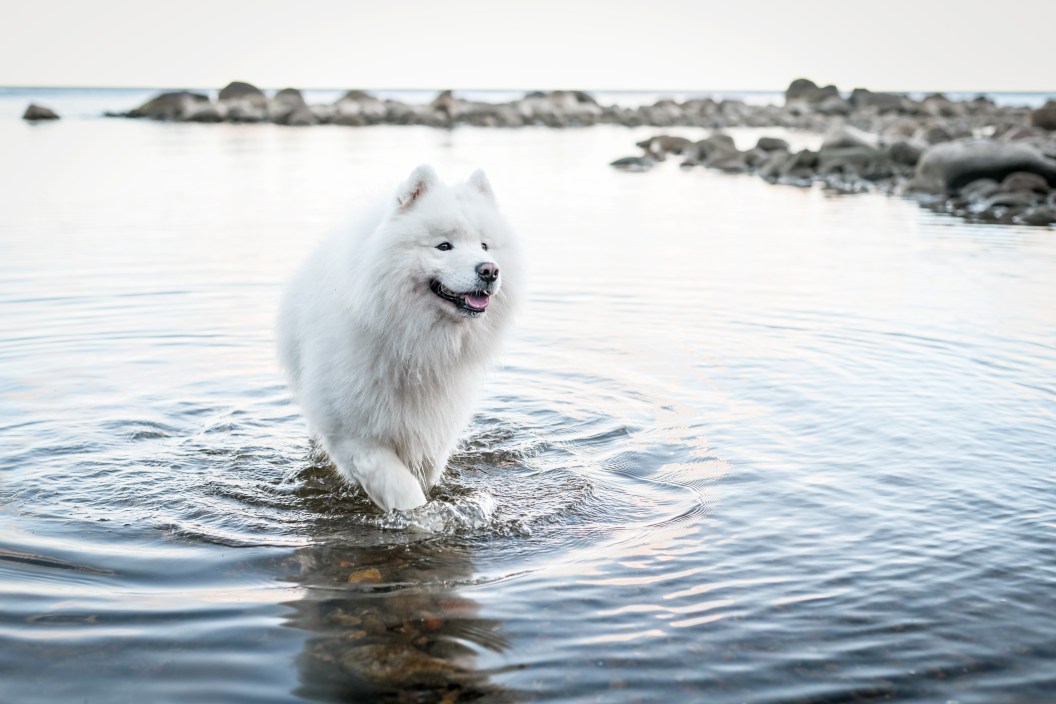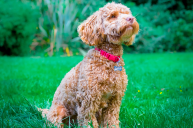It presents quite a conundrum when you're a dog lover with an allergy to pet fur and dander. Do you forgo getting a pup for fear of dog allergies? Because, let's be honest, no one likes constantly sneezing and dealing with watery eyes or a runny nose. Or do you find a so-called "hypoallergenic dog" that allows you to cuddle a pooch without the nasty side effects?
You can choose among many hypoallergenic dog breeds, including the ever-popular labradoodle, created specifically for allergy sufferers by mixing a poodle and a Labrador retriever. But as we learned when we spoke with an allergist, even dog breeds touted as hypoallergenic—including hairless dogs—can cause problems for pet allergy sufferers. In light of that revelation, are Samoyeds hypoallergenic? Read on for that answer, and a lot more about these fluffy, white herding dogs.
What Causes Allergies to Dogs?

Getty Images, YakobchukOlena
Many people think that dog fur or hair is the main source of allergens. However, that isn't usually the case. People who are allergic to dogs are usually allergic to the dander, or the flakes of dead skin that all warm-blooded animals—including humans—constantly shed. Dander is released into the air as they move, especially as a dog sheds its hair. Most breeds produce a good amount of dander, which stimulates allergic reactions. Some dogs, such as Samoyeds, produce less dander than others, even though they have a lot of hair.
However, that does not mean that Samoyed dogs are necessarily hypoallergenic. While these hypoallergenic dog breeds produce less dander, they still produce some. For people who are sensitive to dander, they'll still have an allergic reaction. Not only that, dander levels aren't the only source of allergens. Proteins found in dog's drool and urine can also be an irritant for allergy-prone dog owners.
Do Samoyeds Shed a Lot?
Samoyeds were originally bred for the cold climates of their native homeland of Siberia. As many Samoyed owners will tell you, these dogs have thick fur, and a lot of it. In addition, the thick, long double coats—which include a top coat and an undercoat—can cause allergies in other ways.
Samoyeds are subject to coat blow, which means they shed their outer coat intensely twice a year, causing hair tumbleweeds to build up. The hair fibers in the air can induce allergies. The thick coat itself can also collect dust and other allergens, stimulating allergic reactions. These Siberian dogs need regular brushing, which may be difficult for Sammy owners with severe allergies. A groomer can help, along with a vacuum and air purifier with good HEPA filters, but there's no guarantee that this will be the best dog for a family with allergies.
Verdict: Are Samoyeds Hypoallergenic?

Getty Images, ArtMarie
While daily brushing, grooming, and bathing a Samoyed can help keep them clean, it's impossible to eliminate all of the dander or dust from their coats. Therefore, while some people allergic to dogs will be comfortable around the Samoyed breed, more sensitive individuals will still find their allergies stirred up. So, all in all, the answer to "Are Samoyeds hypoallergenic?" is no.
There is no such thing as a truly hypoallergenic dog; there are only dogs that cause less of a reaction. For some people, no breed would work in their homes without making them feel ill. If you have allergies and are considering purchasing or adopting a particular kind of dog, spend plenty of time with the breed to get an idea of how it triggers your allergies.
If you want a Samoyed puppy, visit the Samoyed Club of America, recognized by the American Kennel Club (AKC), to find responsible breeders near you.
When inquiring about the Samoyed breed, check with a reputable breeder about the dog itself having possible health problems. According to the American Kennel Club, the breed is prone to hip dysplasia and known for having a very long list of eye problems, including progressive retinal atrophy, which responsible breeders will test for.
READ MORE: Best Advice for Dog Owners with Allergies




